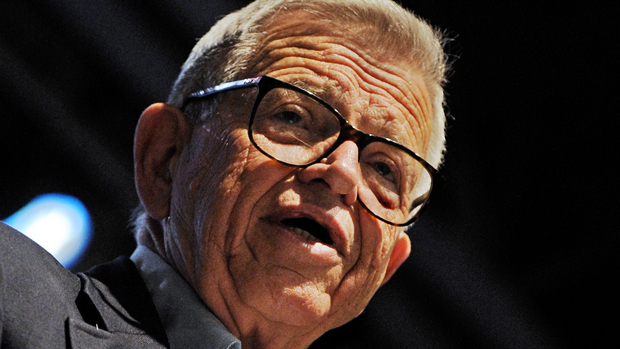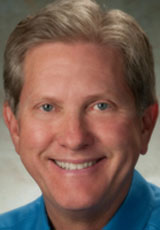Three years ago this week marks the anniversary of the death of Chuck Colson. We spoke with his pastor, Dr. Hayes Wicker. who told us about what Chuck was like not only as a congregant but as a friend.
1. Most people know Chuck Colson as a former politico or influential evangelical leader, but what was Chuck Colson like as a church member?

I was privileged to be Chuck Colson’s pastor from the winter of 1992 until he graduated to glory. It was a great honor to preach his memorial service in Naples and to participate in the interfaith celebration of his life in the National Cathedral.
Chuck not only joined our church but became a faithful member, often attending Sunday morning service even if he had flown in early that morning from a speaking engagement. He even took notes on the sermons. He and Patty were faithful stewards of their resources, often giving to our many building campaigns. He shared with me that at one point they were tempted to move from Naples because of its growth as a metropolitan area but shared that they decided to stay simply because of their beloved church.
Chuck invited people to attend from the community, once inviting a stranger at Wal-Mart, telling her, “Things are happening down there.” He gave great credibility to our ministry in 1993 by teaching an apologetics class, “Why Believe?” We allowed only non-members to attend. It was the foundation for his book, How Now Shall We Live?
2. Colson led a para-church organization, but was an outspoken advocate for the local church, with books such as The Body and Being the Body. What can pastors learn from the life of this man?
Chuck certainly practiced what he preached. He unapologetically declared that he was a southern baptist and believed strongly that we must uphold the Baptist Faith and Message. In an age when many seem to shy away from identifying with a denomination, he knew that he was on a winning team. He never waffled in his convictions and never wavered in his commitment to his church. I have heard him boldly preach the resurrection of Jesus Christ at both a maximum security prison and at a secular civic club. He despised the lack of conviction in many preachers and honored courage as a key virtue.
I learned much from him about the need to utilize a good sense of humor, story-telling, and a reasoned approach to apologetics. Chuck’s life was a constant reminder of how the Lord fulfills Romans 8:28 through our failures. I preached from Philippians 1:12-18 at his memorial service, because “What happened to him served to advance the gospel” in his “imprisonment for Christ.”
Chuck realized that he was also “a man under authority.” When his autistic grandson witnessed baptism in our church, Chuck asked for me to authorize him to baptize Max in his private pool with some family in attendance. It was one of the great blessings of Chuck’s life, as well as mine.
He never waffled in his convictions and never wavered in his commitment to his church. I have heard him boldly preach the resurrection of Jesus Christ at both a maximum security prison and at a secular civic club.
3. Chuck Colson was not only a member of your church, but was also a close friend. What lessons did you learn from your friendship with him?
Naturally, I will deeply miss Chuck, who was one of my closest friends, but he was also a wonderful Paul to this Timothy. He would often call me after a message to encourage me and even step before the church at times after the message to affirm what I had just said. I’ll never forget how he wore a “Hayes Wicker” mask at my surprise 50th birthday party or how he took me out on his boat to the Gulf and showed me a well-worn prayer card with my family’s names on it.
His friendship was like “iron sharpening balsam wood!” He gently and privately challenged me a few times when I was not clear on theological language. He was always gracious and encouraged me to incorporate apologetics into my expository preaching.
He subscribed to magazines for me so that I might be more aware of political, cultural, and moral issues. Though he was known as the White House “Hatchet Man” in the Nixon era, he was incredibly gracious to all whom he met. I learned from him to give attention to details and to love the lost and the least of society. He was a true hero to my children.
4. Some pastors might be intimidated by pastoring someone as well-known as Chuck Colson. What advice would you give for pastors as they think through ministry to famous people?
I was initially somewhat intimidated by Chuck’s presence. In my very first sermon in Naples, he sat with Cliff Barrows of the Billy Graham Evangelistic Association. The next week he sat with the former President of Trinity Seminary. I realized that I needed to be more careful in my research since someone was listening who was one of the most brilliant men on the planet. I also learned that he needed not only a pastor but a friend.
We pastors must help our people to respect privacy of the famous person. I learned from Chuck to find my confidence in Christ even as I accompanied him to Washington and other places and spent time with some very famous people in both politics and in the religious world. Wherever we went, Chuck unfailing praised our church and my ministry. We pastors should also affirm other ministers at every opportunity.
We pastors must help our people to respect privacy of the famous person. I learned from Chuck to find my confidence in Christ even as I accompanied him to Washington and spent time with some very famous people in both politics and in the religious world.
5. What advice do you think Chuck Colson would give to today’s pastors and church leaders ministering in an increasingly post-Christian culture?
At his memorial services, we honored the old Marine Captain’s motto: “Stay at your post; do your duty.” Chuck would be the first to remind ministry leaders that we are to courageously be willing to suffer “as a good soldier of Jesus Christ.” Chuck was very proud of his service in the Marine Corps and his entire Christian life could be characterized by the motto, “Semper fi.” We must be faithful and finish well.
At lunch one day, as Chuck was encouraging me to develop a writing ministry, I brought up the issue of longevity. He responded, “Why should anyone retire when there is so much work to be done?” In old age he was still bearing fruit, as the psalmist described. When Chuck spoke for the last time publicly without collapsing, it was at our church as he and Britt Hume challenged us to unashamedly proclaim Christ in a post-modern culture.
Chuck would encourage us to be readers and students of the culture. He often described himself as “having the Bible in one hand and the New York Times in the other.” He would urge all ministers to speak simply to the prisoner, eloquently to the educated person, and boldly to those in power.
Chuck was a firm believer that Jesus Christ is the Lord of all of life, so he deplored compartmentalization of the secular and the spiritual. Though the pulpit is not to be a place of political promotion, moral and ethical issues demand the application of the truth of scripture. We must not back down or shut up concerning religious liberty, the sanctity of human life, biblical marriage, and other issues.
Chuck never gave up hope like his hero, William Wilberforce, to “reform matters” in an ungodly country. Chuck knew that true transformation of the gospel was the only hope for genuine, biblical reform in the family, church, community, and state. The Great Commission to make disciples also implies a “Cultural Commission.”
Daniel Darling is vice-president of communications for the Ethics and Religious Liberty Commission. He is the author of several books, including his latest, Activist Faith.










